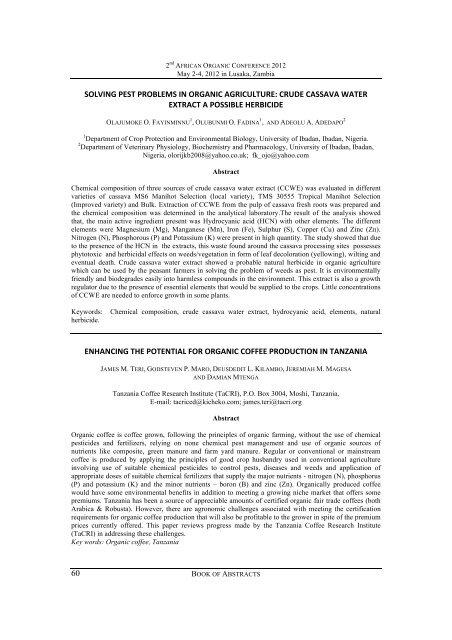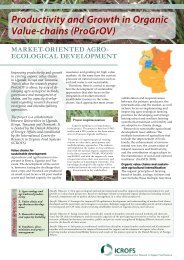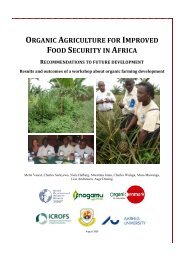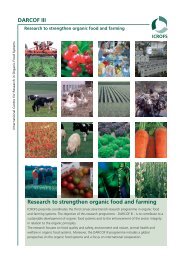The 2nd African Organic Conference â Mainstreaming ... - ICROFS
The 2nd African Organic Conference â Mainstreaming ... - ICROFS
The 2nd African Organic Conference â Mainstreaming ... - ICROFS
You also want an ePaper? Increase the reach of your titles
YUMPU automatically turns print PDFs into web optimized ePapers that Google loves.
2 nd AFRICAN ORGANIC CONFERENCE 2012<br />
May 2-4, 2012 in Lusaka, Zambia<br />
SOLVING&PEST&PROBLEMS&IN&ORGANIC&AGRICULTURE:&CRUDE&CASSAVA&WATER&<br />
EXTRACT&A&POSSIBLE&HERBICIDE&<br />
OLAJUMOKE O. FAYINMINNU 1 , OLUBUNMI O. FADINA 1 , AND ADEOLU A. ADEDAPO 2<br />
1 Department of Crop Protection and Environmental Biology, University of Ibadan, Ibadan, Nigeria.<br />
2 Department of Veterinary Physiology, Biochemistry and Pharmacology, University of Ibadan, Ibadan,<br />
Nigeria, olorijkb2008@yahoo.co.uk; fk_ojo@yahoo.com<br />
Abstract<br />
Chemical composition of three sources of crude cassava water extract (CCWE) was evaluated in different<br />
varieties of cassava MS6 Manihot Selection (local variety), TMS 30555 Tropical Manihot Selection<br />
(Improved variety) and Bulk. Extraction of CCWE from the pulp of cassava fresh roots was prepared and<br />
the chemical composition was determined in the analytical laboratory.<strong>The</strong> result of the analysis showed<br />
that, the main active ingredient present was Hydrocyanic acid (HCN) with other elements. <strong>The</strong> different<br />
elements were Magnesium (Mg), Manganese (Mn), Iron (Fe), Sulphur (S), Copper (Cu) and Zinc (Zn).<br />
Nitrogen (N), Phosphorous (P) and Potassium (K) were present in high quantity. <strong>The</strong> study showed that due<br />
to the presence of the HCN in the extracts, this waste found around the cassava processing sites possesses<br />
phytotoxic and herbicidal effects on weeds/vegetation in form of leaf decoloration (yellowing), wilting and<br />
eventual death. Crude cassava water extract showed a probable natural herbicide in organic agriculture<br />
which can be used by the peasant farmers in solving the problem of weeds as pest. It is environmentally<br />
friendly and biodegrades easily into harmless compounds in the environment. This extract is also a growth<br />
regulator due to the presence of essential elements that would be supplied to the crops. Little concentrations<br />
of CCWE are needed to enforce growth in some plants.<br />
Keywords:<br />
herbicide.<br />
Chemical composition, crude cassava water extract, hydrocyanic acid, elements, natural<br />
ENHANCING&THE&POTENTIAL&FOR&ORGANIC&COFFEE&PRODUCTION&IN&TANZANIA&<br />
JAMES M. TERI, GODSTEVEN P. MARO, DEUSDEDIT L. KILAMBO, JEREMIAH M. MAGESA<br />
AND DAMIAN MTENGA<br />
Tanzania Coffee Research Institute (TaCRI), P.O. Box 3004, Moshi, Tanzania,<br />
E-mail: tacriced@kicheko.com; james.teri@tacri.org<br />
Abstract<br />
<strong>Organic</strong> coffee is coffee grown, following the principles of organic farming, without the use of chemical<br />
pesticides and fertilizers, relying on none chemical pest management and use of organic sources of<br />
nutrients like composite, green manure and farm yard manure. Regular or conventional or mainstream<br />
coffee is produced by applying the principles of good crop husbandry used in conventional agriculture<br />
involving use of suitable chemical pesticides to control pests, diseases and weeds and application of<br />
appropriate doses of suitable chemical fertilizers that supply the major nutrients - nitrogen (N), phosphorus<br />
(P) and potassium (K) and the minor nutrients – boron (B) and zinc (Zn). <strong>Organic</strong>ally produced coffee<br />
would have some environmental benefits in addition to meeting a growing niche market that offers some<br />
premiums. Tanzania has been a source of appreciable amounts of certified organic fair trade coffees (both<br />
Arabica & Robusta). However, there are agronomic challenges associated with meeting the certification<br />
requirements for organic coffee production that will also be profitable to the grower in spite of the premium<br />
prices currently offered. This paper reviews progress made by the Tanzania Coffee Research Institute<br />
(TaCRI) in addressing these challenges.<br />
Key words: <strong>Organic</strong> coffee, Tanzania<br />
60<br />
BOOK OF ABSTRACTS





